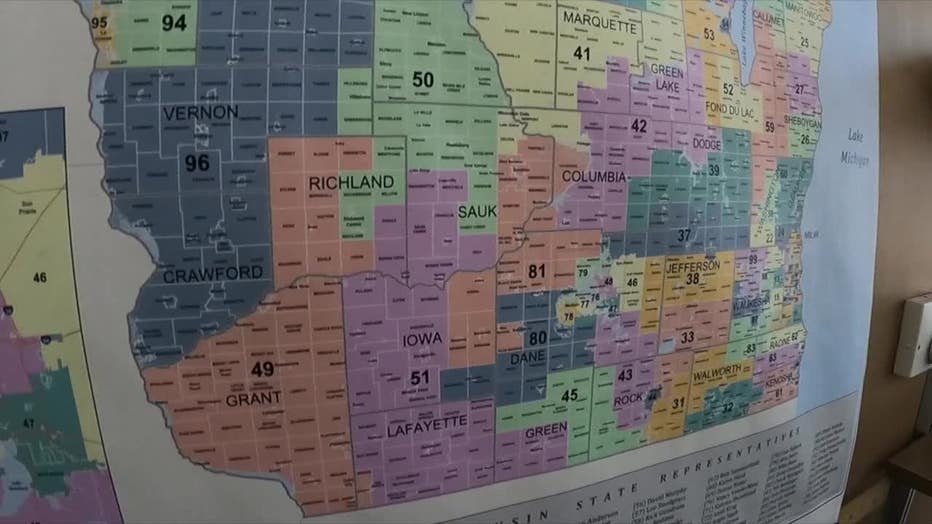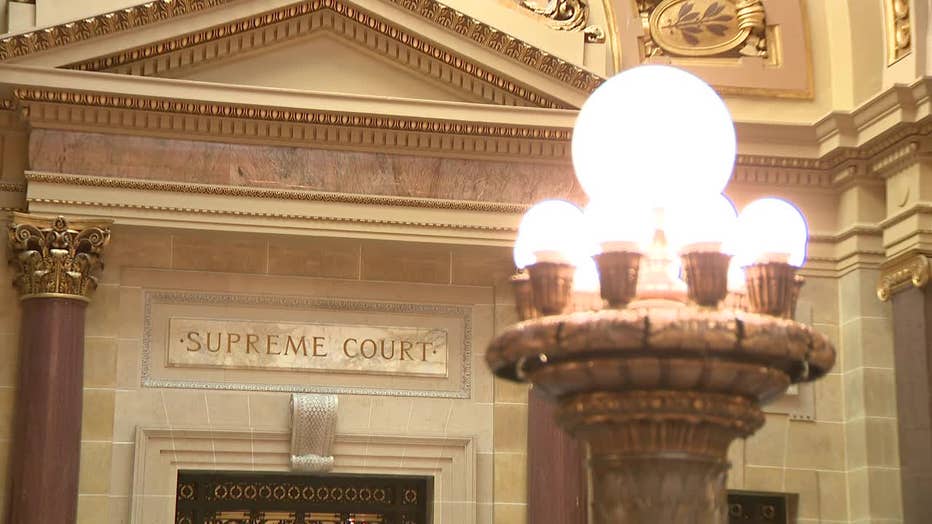Redistricting case, Wisconsin Supreme Court hears map challenge
Wisconsin Supreme Court hears map challenge
The Wisconsin Supreme Court weighs whether to throw out the state's current legislative maps – a case that could change the future of the state's politics.
MADISON, Wis. - The Wisconsin Supreme Court heard oral arguments on Tuesday on whether to throw out the state's current legislative maps – a case that could change the future of Wisconsin politics.
"Almost half of the Assembly districts in our state have an unconstitutional violation, so why don’t we start clean?" asked Justice Jill Karofsky during the arguments.
Liberal groups filing this case asked Wisconsin justices to toss maps drawn by Republicans. They want all legislators to face election in 2024, including senators whose terms run through 2026.
SIGN UP TODAY: Get daily headlines, breaking news emails from FOX6 News
Justice Rebecca Bradley: "You are asking to unseat all the senators in the odd-numbered districts, you are saying that they don’t have the authority to hold their seats. Does that also invalidate all of the legislation that was passed by these legislators who are somehow unlawfully occupying their seats?"
Tamara Packard, representing Democratic Senators: "We are asking that this court have elections that are based on a constitutional map."
Bradley: "That’s an extreme remedy which in the past, when it was requested in Trump v. Biden, this court rejected. It’s an absolute extraordinary remedy, and it sounds – there are many intonations about Democracy throughout the briefing. I can’t imagine something less Democratic than unseating most of the Legislature that was duly elected last year."
Justice Janet Protasiewicz: "I have to agree, it’s an extreme remedy. Tell me, is there any precedent for using a writ that would oust such a big chunk of the state Legislature? Has this ever been done before?"
Packard: "I don’t know of any, but this is a really big problem, your honor."
The Wisconsin Supreme Court decided on the current maps in 2022 – before control of the court flipped to a liberal majority. During this year's campaign, Protasiewicz called the maps "rigged."

Wisconsin Legislative map
"Where were you, where were your clients, two years ago, because we’ve already been through this?" asked Justice Rebecca Bradley. "Redistricting happens once every 10 years after the census.
"Everybody knows that the reason we are here is because there was a change in the membership of the court," she stated.
The case centers on the Wisconsin Constitution's requirement that districts be of "contiguous territory." Liberal attorneys said islands on the district maps break the clear meaning of the state constitution.
FREE DOWNLOAD: Get breaking news alerts in the FOX6 News app for iOS or Android
"There’s like a total of seven across the country. They haven’t been challenged. Wisconsin has 75. This shocks people across the country who look at this map," said Attorney Mark Gaber with Campaign Legal Center.
Conservatives said the legislative islands have been in approved maps for 50 years, and that it's due to annexed cities or keeping towns together.
"The governor himself proposed a remedy with municipal islands and this court took it," said Taylor Meehan, who is representing Republican legislators. "I don’t see how the governor can now come in and say: ‘We were wrong all along.’"

Wisconsin Supreme Court
The meaning of that word "contiguous" was debated during oral arguments Tuesday.
Justice R. Bradley: "How did they define it in 1848?"
Meehan: "In 1848, you have dictionary definitions using both of those definitions: either physical adjoining in some respect, or near or close by."
Justice Karofsky: "That’s the tail leading the dog. You're telling us to use one definition because it will help your argument, and I’m pretty sure the rule is that we’re supposed to look at the definitions to figure out what the law is."
Justice Ann Bradley: "Then [the time of the state's founding], the main dictionary was Merriam-Webster, according to some historical accounts, and that deals with some kind of physical contacts."
Meegan: "In 1848, we’ve cited examples of contemporaneous dictionaries that have what’s called a looser definition."
The justices also questioned what should come if the court ruled against the current maps.
Karofsky: "Should we find these maps to be unconstitutional, you would just have us sit with them, we just shouldn’t worry about it, we should say: ‘You know, state of Wisconsin, we have unconstitutional maps, live with it until 2031.’"
Rick Esenberg, Wisconsin Institute for Law and Liberty: "There is some finality, and people can rely on the districts look like they do."
Justice Rebecca Dallet: "So, the constitution takes a back seat to what you just described?"
Esenberg: "At some point, there has to be an end."
Justices did not say Tuesday when they will reveal their decision, but the clock is ticking; Wisconsin is less than a year away from Election Day.
The Wisconsin Elections Commission said maps must be ready by March 15, 2024 to be used in the November elections.

Group assembles during Wisconsin Supreme Court hearing on legislative maps
The Legislature argued that if new maps are ordered, nothing should be enacted any sooner than the 2026 election. And if maps are ordered, the Legislature should be given the first chance to draw them, Meehan said. Both she and Esenberg urged the court not to get into the "political thicket" of drawing maps.
The state's recent presidential elections have been decided by less than a point, but Senate Republicans hold a supermajority. In the Assembly, the GOP is two seats short of a supermajority. That could all change if the court strikes down the current maps.
Reaction
Senate Majority Leader Devin LeMahieu (R-Oostburg) and Speaker Robin Vos (R-Rochester)
"The petitioners waited two years to file their meritless redistricting claims—and yet they waited only one day after Justice Protasiewicz’s investiture. Now they want to give the parties mere weeks to litigate Democrats’ demand for new maps statewide. Rushing to upend the 2024 elections and cancel the terms of the 17 duly elected Senators will prove this case to be the campaign promise that Justice Protasiewicz professed it wasn’t."
The Associated Press contributed to this report.

